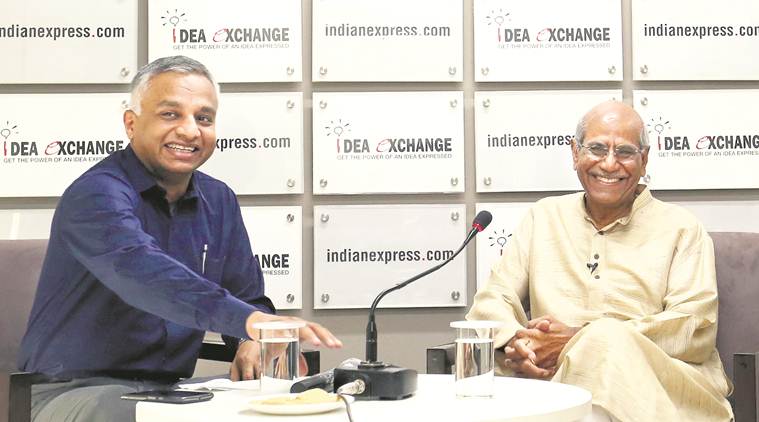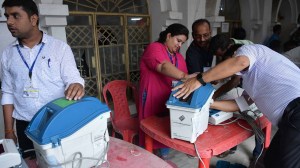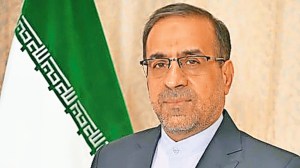- India
- International
People say in Doklam, India is better placed. Why do we think Chinese could only act here? says Shyam Saran
Shyam Saran said, "There should be mutual disengagement. After all, Indian presence in the area was triggered by Chinese action, which changed the status quo. There was an agreement with Bhutan, in 1998, that there should be no change in the status quo until the border agreement has been concluded."
 Former foreign secretary Shyam Saran with Associate Editor Sushant Singh at the Idea Exchange in The Indian Express office. (Source: Express photo by Amit Mehra)
Former foreign secretary Shyam Saran with Associate Editor Sushant Singh at the Idea Exchange in The Indian Express office. (Source: Express photo by Amit Mehra)
Former foreign secretary Shyam Saran talks about what has changed between India and China, why India can’t back down, the time India, Pakistan came close to signing the Siachen deal, why we shouldn’t fear losing Bhutan, and why ‘mutual disengagement’ is the only answer to the current standoff with Beijing.
Why Shyam Saran
Shyam Saran’s is one of the most coherent voices in India on everything from China to climate change. As Indian and Chinese troops engage in a tense standoff in the Doklam region, Saran says he “would not rule out further escalation”. During his career in the Indian Foreign Service, Shyam Saran has been India’s ambassador to Nepal, Myanmar, Indonesia and Mauritius. He was in Narasimha Rao’s PMO in 1991-92, was foreign secretary from 2004-2006, and has been special envoy for Indo-US nuclear ties and special envoy and chief negotiator on climate change. His book How India Sees the World: Kautilya to Modi is set to be released soon.
Sushant Singh: You said the Chinese have been coming into Doklam from 1983. They also destroyed our bunkers in 2007 and 2008. What red line was crossed this time?
The strategy the Chinese have followed in the past is to keep pushing but not quite cross the threshold that could invite a significant pushback. If there is an encounter, you have an exchange of words and you disengage. So there is always a dilemma: when do I react? In this case, both for Bhutan as well as for India, that point came with the making of a highway, permanent infrastructure, which would significantly enhance Chinese capability in the region. So the reaction is because of that sense: that if we do not take a stand now, it will be difficult to reverse what could have become a permanent kind of threat.
Sushant Singh: How would a military conflict between India and China play out?

Military conflicts are always hard to predict. People have been saying that should something happen in Doklam itself, India is better placed because it dominates the heights. But why do we think the Chinese could only act here? They could act somewhere else. There is no doubt that the Chinese have vastly improved infrastructure on their side. The ability to rapidly move forces to the Line of Actual Control is certainly better than what it was, say, 10 years ago. This is not to say the infrastructure on the Indian side has not improved, but the other side has done better… We have to play this in a manner so that the risks are minimised as far as possible and yet, it would not be a good development if, having confronted them, we have to step back.
Sushant Singh: What solutions would ensure there would be no military conflict and yet, India won’t lose face?
There should be mutual disengagement. After all, Indian presence in the area was triggered by Chinese action, which changed the status quo. There was an agreement with Bhutan, in 1998, that there should be no change in the status quo until the border agreement has been concluded. So if you want to defuse the situation, return to status quo… Given the kind of situation we are faced with, we should be ready for not-so-pleasant eventualities as well.
Shubhajit Roy: Is there a risk of losing Bhutan?
Why should there be such a risk? It is an issue that concerns Bhutan as well because the country’s communication lines are also through the same Siliguri corridor. This is a move that has been made by China very cynically, thinking they can embarrass Bhutan into accepting the change in status of the area. After all, China and Bhutan have had 24 rounds of negotiations over the border and this area is one of the regions under dispute. Why are you now saying ‘There is no dispute, this is Chinese territory’… Perhaps more strangely, the Chinese side says they had informed the Indian side that they were going to undertake this activity… Why would you inform the Indian side if you were so sure that this territory belonged to you?
Coomi Kapoor: Isn’t it true that a small country like Bhutan would like to have diplomatic ties with China, and it is India which is stopping it?
That is not the reality. The people in Bhutan are ethnically close to those in Tibet. An open kind of relationship with China would mean, in practice, an open kind of relationship with Tibet on the other side. Second, don’t forget that the kind of policy that Bhutan has followed over the last several years has been to incrementally expand its engagement with the rest of the world. India has not stood in its way. When Bhutan has felt ready to, for example, become a member of the United Nations, India sponsored their membership. Or when they wanted to have a United Nations office in Bhutan, we had no problems. So, it is really for Bhutan to decide what its comfort level is, in terms of expanding its own engagement with the rest of the world… it is not that India is going to prevent you. In any case, there is not much India can do to prevent them. The only thing which the Indian side would like to be assured of is that there should be no surprises in terms of the move that Bhutan makes. That is the only requirement.
Coomi Kapoor: Bhutan is a small monarchy. It has seen the example of the Nepalese monarchy. So it probably wouldn’t like to alienate China.
There is no comparison between the monarchy in Bhutan and in Nepal. The monarchy in Bhutan has a very different kind of standing amongst the people for the kind of contribution it has made to the development of Bhutan. To the extent that it has become the richest country in South Asia, through very close cooperation with India, particularly on hydro-power. If you take the Nepal example, it is exactly the opposite… The Bhutan example is actually what can be done if, what you call a small country, is ready to hitch itself to a dynamic economy and profit from it. Now, as has been said, yes there are people (in Bhutan) who would say, ‘We should open ourselves to having similar kind of benefits from our relationship with China’. Let that debate take its course in Bhutan. I don’t think we should insert ourselves into it.
Raj Kamal Jha: Before Doklam, we have seen tension over the Jaish blacklist issue and NSG membership… Then there is the CPEC (China-Pakistan Economic Corridor). Do all these complicate Doklam? Is there a substantive difference in the way this government looks at Beijing as compared to the UPA?
Doklam, as you rightly are suggesting, is not an isolated event. So what is that larger context? I take you back to 2005, the announcement of the strategic and cooperative partnership between India and China. At that time, the Sikkim issue was finally resolved, with the Chinese giving us a map showing Sikkim to be a part of India… India and China are the two most important emerging countries. They have certain common interests, in trying to adjust the global regimes, adjust the global order, so that it is more aligned to our interests… Now, if we work together along with some other emerging countries, maybe we can bring about a certain change in this architecture. Second, there are many new domains which are emerging, climate change being one of them. Or, for example, cyber security. These are all new areas which are essentially anarchic. So if we want to make certain that those emerging regimes are conducive to our interests, if we work together, it is more likely that we will be able to get an order conducive to our interests. So, what were the terms in which this was mentioned? Partly rhetoric but a certain substance to it. Number 1, India is not a threat to China; China is not a threat to India. India emerging is an opportunity for China, and China is an opportunity for India. There is enough space for India and China growing together; enough space for India and China in the world.
If you recall, we had the guiding principles, political parameters for resolving the border issue also agreed upon at that time. And two very key provisions of that were actually, from our point of view, very major gains. One was that settled populations will not be disturbed in any settlement. Second, prominent geographical features have to be taken into account in settling the border issue. That is the watershed principle that we have been insisting upon. That was a certain high point of our relationship, because of a sense in China that India and China actually working together can make a difference…
Then you come now, 10 years later. What has changed is that kind of sense of India and China… Those days don’t forget that people were looking at India as the next China. India was growing at the rate of 8-9 per cent per annum. So there was a sense that this was going to be the next power. Not superpower but at least the next big power. Today, that has changed. What is the kind of response we get from the Chinese when we talk about our differences? They say, ‘You should accept the fact that we are five times your size. Our GDP is five times that of India… Therefore we don’t need to be as sensitive to your concerns as we were 10 years ago’. You saw that already in… climate change. In 2009, when I was dealing with climate change, the formal deal was concluded amongst whom? (Barack) Obama sitting on one side, India, China, Brazil, South Africa sitting on the other side. That is how the Copenhagen accord was negotiated. China could not have done it alone. You fast forward to the eve of the Paris agreement. Who makes the deal? It is China and the United States making the deal… And though you are opposed to many elements of the deal, you can’t do anything about it. Exactly the same thing with the Nuclear Suppliers Group (NSG). In 2008, when I was negotiating, when Shankar Menon was negotiating, at that time, China was opposed. Yet they never took a public stand against India…
So the change which has taken place is, ‘Why do we need to be careful about Indian sensibilities?’… If you look at what has been happening over the last couple of years, despite a very bold move made by the current Prime Minister (Narendra Modi) — look at the bonhomie when Xi Jinping came to Gujarat and the Prime Minister went to Xiang — this seems very odd. But the context has changed. And of course, what has been mentioned by you about the CPEC, the commitment to Pakistan is much higher than what it was a few years ago. Because Pakistan is not just a proxy against India, it has become a very important component of the One Belt One Road, which is a signature intitiative of the Chinese leader himself…
We have to look at the change in the relationship not so much in terms of what this government has been doing. This government has been reacting to a very changed stance on the part of China.
Raj Kamal Jha: So you are saying that key to the shift is Beijing’s view now that India is not quite what it’s made out to be, that it can bully India. So how should India react?
Don’t be bullied. As simple as that. It is another matter on where you take a stand. That is a matter of judgment. But let me also try to give you a slightly different picture, even in terms of China’s relations with South-East Asia. Most people believe that the Chinese have sewn up South-East Asia. Nobody has really been able to resist their advances in the South China Sea… And what has that strategy been? Incrementally keep on changing, what they call ‘the cabbage strategy’. One layer after another you keep opening. None of the singular moves is serious enough to attract opposition but then, cumulatively, you come to a point where it has actually changed their entire security situation dramatically. It is very hard to reverse. Then you have to go to war to try and reverse it. Now, look at two things which have happened, which are very, very important. One, Indonesia… there is no dispute as such with China. They have an island called Natuna island, which the Chinese have in fact confirmed belongs to Indonesia. Now what Indonesia has done is that the sea they have, they named it Natuna Sea… There was a huge reaction from the Chinese saying, ‘No way, this is not Natuna Sea, this is South China Sea’. Look at Singapore. The head of the Lee Kuan Yew School made a statement that we need to be pragmatic, that a small country like Singapore cannot try to shape the world around it. Essentially what he was saying was that you have to recognise that China is the big dog in the area and you have to acquiesce to that. He used a rather unfortunate phrase: ‘If your head is not big enough, don’t wear a sombrero’. There was a huge reaction in Singapore. And the foreign ministry made a statement, saying, ‘We may be a small country but if the interests of Singapore are threatened by any major power, we will resist’. So what I’m trying to say is that there is a certain pushback taking place. In that context also, what is happening at Doklam is worrying to the Chinese because it may mean that it only reinforces the kind of pushback that is taking place.
Seema Chishti: In the world view that you laid out, China perhaps sees us as not that important. Could it actually be the exact opposite? This whole US pivot to Asia and how India has steadily moved on another course, there may be more insecurities vis-a-vis India. And number two, are you happy with the way India is located vis-a-vis its neighbours? We don’t want to talk to Pakistan, we have problems with Nepal, we don’t know what will happen in Bangladesh if Sheikh Hasina goes.
With respect to your first question, let me say very categorically that the more isolated you are, the more vulnerable you will be to Chinese pressures. The more options you have, the more network of strong relationships you have with other major countries, actually helps you deal with other challenges… The constraint on China will be precisely because it sees that I have these relationships.
(On neighbours) It is not a matter of success or failure. I have said on many occasions that the the first priority of Indian foreign policy has to be the management of its neighbours. Part of the problem has been that our engagement with our neighbours has been somewhat episodic. It has not been a sustained, consistent engagement. A lot of oxygen is taken away through our relations with Pakistan. Which means that you have that much less resources, attention available for other neighbours.
The other problem with our neighbourhood — and this not only with respect to what is happening in our neighbourhood — is our inability to deliver on what we commit ourselves to. Projects that we promise in Nepal or projects that we have committed ourselves to in Myanmar or in Bangladesh, it takes an inordinate amount of time to implement. That is a governance issue, not being able to make the kind of structural changes which are absolutely essential to be able to do that. The Chinese score by being able to deliver on what they commit much more speedily. So why should it surprise that there is a certain lack of credibility in terms of our engagement with our neighbours? The third point is that there is no doubt that we have major assets in our relationship with our neighbours because of very strong cultural ties. The fact that there is a proximity means also that being the largest country, the largest economy in the region, if you really opened out to them, you could become the engine of growth for these countries. Take for example transport linkages. Supposing tomorrow you were to say I am ready to give national treatment to all our neighbours in transportation — ‘Use any port you want, any railway’. In terms of load on your transportation infrastructure, that would be minimal, but the political impact would be huge. But somehow because of local issues, security considerations come in….
Sushant Singh: When you were foreign secretary (in 2005), the Siachen issue came absolutely close to being resolved, till a few people in the CCS (Cabinet Committee on Security) spiked it. Can you recount that?
It was the basis on which we would have tried to reach an understanding with Pakistan, which was actually not new. Essentially it was that both sides would mark where they are, their current position, and the position to which they would retreat once they had decided on this retreat. And therefore you would create a zone of disengagement and that zone could then be very carefully patrolled, monitored so that neither side tried to change the status quo. In principle, we could say that yes there was an agreement… You could perhaps start with the first phase in the least-risky area, gain confidence, then go to the second phase which would be somewhat more risky areas… On the eve of the defence secretary-level talks, there was a CCS meeting to try and make this the basis on which to carry forward the negotiations. It was at that point that serious reservations were expressed by some members on if we could really trust the Pakistani side. My own view was that it was a risk worth taking. Because diplomatic opportunities are not something you can keep on the shelf and decide when you want to use them… (By) 2007 much of the positive developments taking place in India-Pakistan relations were no longer there, not because of what we did but because of the internal situation in Pakistan.
Shailaja Bajpai: In the light of President Trump, what do you think of the new world order we are seeing and particularly the potentially very big international crisis with North Korea? And secondly, can there be any Paris climate agreement without the Americans?
To answer the second question first, it was not as if in the Paris agreement very major commitments were made by any of the big economies, including the US. So in terms of what really will be the actual impact, my view is not very much. But not very much all around because the Paris agreement, in terms of the challenge we are facing, actually falls much, much short… It will certainly mean that the burden on developing countries like India will be greater.
About Trump, I think the biggest problem we are facing is the unpredictability and uncertainty that his presidency has created. It is not only that it involves a country that has global presence… you are never certain whether decision-making today in the US is something going through a certain deliberative process. So, in that context, yes, the risk of an inadvertent kind of crisis… with respect to north Korea is possible.
Apr 18: Latest News
- 01
- 02
- 03
- 04
- 05





























